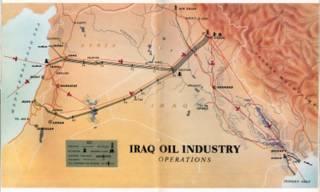Chalabigate

2004-12-11
Israel's pipe dream: getting oil from Iraq
Times Senior Correspondent
Published August 15, 2004
There's an old joke Israelis like to tell on themselves: Their ancestors followed Moses around for 40 years and he led them to the only place in the Middle East without any oil.
More than three millennia later, Israel's energy outlook has barely improved. Although it is in a region awash with oil, the Jewish state must import most of its supplies from Russia because Arab oil producers refuse to deal with it.
Assuring Israel of an adequate oil supply has long been a goal not just of Israel itself, but also of pro-Israel factions in the United States. Thus emerged a controversial plan that is still kicking around even though its chief booster, Ahmad Chalabi, could soon be behind bars.
Once the Pentagon's choice to lead the "new" Iraq, Chalabi promised to reopen an old British-built pipeline from Kirkuk in northern Iraq to the Israeli port of Haifa. The plan impressed Richard Perle, Douglas Feith and other conservatives influencing Bush administration policy toward Iraq in the lead-up to last year's war.
The idea also drew enthusiastic response from Israel.
"The pipeline would be a dream," Yosef Paritzky, Israel's minister of infrastructures, said as reported by Salon.com. "We'd have an additional source of supply, and could even export some of the crude through Haifa. But we'd need a treaty with Iraq . . . to build the pipeline."
Once Chalabi assumed a position of influence in the new Iraqi government, Israel would get its treaty, the neoconservatives were assured. The pipeline was by no means the only reason for going to war, but it could well have been one reason.
After the invasion, though, Chalabi began to slide from U.S. favor when it became apparent his Iraqi National Congress provided faulty intelligence on Iraq's alleged weapons of mass destruction. A rival, Iyad Allawi, became Iraq's new interim prime minister, and an arrest warrant issued last week accuses Chalabi of counterfeiting Iraqi currency.
As Chalabi's bubble deflates, so has the idea of the Kirkuk-Haifa pipeline. But does a pipeline even make sense? Yes and no, experts say.
A direct pipeline from Iraq might reduce Israel's energy costs, now inflated by the cost of shipping oil from Russia. Because the pipeline might cross Jordan, that struggling country could reap lucrative transit fees. And the United States, a close ally of both Israel and Jordan, would benefit from better access to the rich Iraqi oil fields, thereby reducing U.S. dependence on Saudi Arabia.
All reasons why the pipeline is such a political hot potato.
"Even the suggestion is going to create trouble because it fuels all Iraqis' suspicion that their country was invaded for Israel's benefit," says Jeremy Binnie, Middle East editor of Jane's Sentinel.
He and other experts note Iraq already has several outlets for its oil, including terminals on the Persian Gulf and a major pipeline through Turkey. The big problem is not a shortage of outlets but protecting the ones it has.
The pipeline through Turkey is frequently sabotaged, and Iraq temporarily stopped pumping oil from its southern fields because of violence in the region.
"Until you can secure an existing pipeline it may not make sense to build another one," says Jim Burkhard, director of oil market analysis for Cambridge Energy Research Associates in Massachusetts.
Another expert questions Israel's claim it could save 20 percent on energy costs by getting oil from Iraq instead of Russia.
"Given the near-perfect price arbitrage in oil markets, this is quite implausible," economist Thomas R. Stauffer writes in the Washington Report on Middle East Affairs. "Only two interpretations suggest themselves.
"First, the Russian oil mafia has succeeded in bilking the Israelis - a formidable task. Or, second, the Israelis and their allies in the Bush administration presume that they can force Iraq to sell oil into the line at a steep discount."
Even if the pipeline never materializes, Israel has an ace in the hole. Under a 1975 memorandum of understanding, the United States guarantees virtually all Israel's oil needs in the event of a crisis - even if it means reducing the amount of oil available to Americans.
http://www.sptimes.com/2004/08/15/Columns/Israel_s_pipe_dream__.shtml
This site may contain copyrighted material the use of which has not always been specifically authorized by the copyright owner. In accordance with Title 17 U.S.C. Section 107, the material on this site is distributed without profit to those who have expressed a prior interest in receiving the included information for research and educational purposes. For more information go to: http://www.law.cornell.edu/uscode/17/107.shtml. If you wish to use copyrighted material from this site for purposes of your own that go beyond 'fair use', you must obtain permission from the copyright owner.





